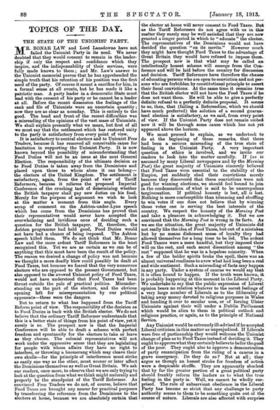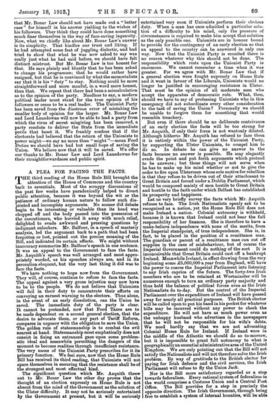TOPICS OF THE DAY.
THE STATE OF THE UNIONIST PARTY.
MR. BONAR LAW and Lord Lansdowne have not failed the Unionist Party in its need. We never doubted that they would consent to remain in the leadership if only the respect and confidence which they inspire, and the indispensability of their services, were fully made known to them ; and Mr. Law's answer to the Unionist memorial proves that he has apprehended the simple truth that his retention of his position was the first need of the party. Of course it meant a sacrifice for him, in a formal sense at all events, but he has made it like a patriotic man. A party leader in a democratic State must lead with the consent of his party or he cannot be a leader at all. Before the recent dissension the feelings of the rank and file of Unionists were an uncertain quantity ; now they are as clear as noonday. This is entirely to the good. The head and front of the recent difficulties was a misreading of the opinions of the vast mass of Unionists. We shall explain presently what we mean, but first of all we must say that the settlement which has restored unity to the party is satisfactory from every point of view. It is satisfactory to neutral electors and to Unionist Free Traders, because it has removed all conceivable cause for hesitation in supporting the Unionist Party. It is now known beyond the possibility of misunderstanding that Food Duties will not be an issue at the next General Election. The responsibility of the ultimate decision as to Food Duties is taken away from the Dominions and placed upon those to whom alone it can belong— the electors of the -United Kingdom. The settlement is satisfactory, again, from the point of view of Tariff Reformers, because it relieves the proposed Imperial Conference of the crushing task of determining whether the British taxpayer shall pay new duties on his food. Merely for the purpose of argument we wish to look at the matter a moment from this angle. Every scrap of comment on the Ashton-under-Lyne speech which has come from the Dominions has proved that their representatives would never have accepted the overwhelming and invidious onus of deciding such a question for the British taxpayer. If, therefore, the .Ashton programme had held good, Food Duties would not have had a chance of being imposed. The Ashton speech killed them. We do not think that Mr. Bonar Law and the more ardent Tariff Reformers in the least recognized this. Yet we are as certain as we can be of anything that this must have been the result of the policy. The reason we desired a change of policy was not because we thought a more deadly blow could possibly be dealt at Food Taxes, but because we feared that the very numerous electors who are opposed to the present Government, but also opposed to the avowed Unionist policy of Food Taxes, would not have understood that Food Taxes had been thrust outside the pale of practical politics. Misunderstanding on the part of the electors, and the obvious opening left for misrepresentation by our political opponents—these were the dangers.
But to return to what has happened from the Tariff Reform point of view. The responsibility of the decision as to Food Duties is back with the British elector. We do not believe that the ordinary Tariff Reformer understands that this is a better state of things from his point of view, yet it surely is so. The prospect now is that the Imperial Conference will be able to draft a scheme with perfect freedom and spontaneity for the electors to take or leave as they choose. The colonial representatives will not work under the oppressive sense that they are legislating for people with whose affairs they have no right to interfere, or throwing a boomerang which may cleave their own skulls—for the principle of interference must strike as easily one way as the other, must sooner or later affect the Dominions themselves as well as Great Britain. We ask our readers, once more, to observe that we are only trying to look at the question from what we think might naturally and properly be the standpoint of the Tariff Reformer. As convinced Free Traders we do not, of course, believe that Food Taxes are brought any nearer for practical purposes by transferring the reference from the Dominions to the electors at home, because we are absolutely certain that the elector at home will never consent to Food Taxes. But as the Tariff Reformers do not agree with us in this matter they surely may be well satisfied that they are now granted a longer period in which to " educate " the elector. The representatives of the Dominions would not have decided the question " on its merits." However much they might have thought Food Taxes to the advantage of Great Britain they would have refused to impose them. The prospect now is that what may be called an intellectually honest scheme will emerge from the Conference and will be laid before the country for discussion and decision. Tariff Reformers have therefore the chance of educating persons who are open to conviction and not persons who are forbidden by constitutional principle to assert their fiscal convictions. At the same time it remains true that the British elector will not have the Food Taxes if he does not want them. He will be able to give a perfectly definite refusal to a perfectly definite proposal. It seems to us, then, that (failing a Referendum, which we should have much preferred) the solution of a, second guaranteed election is satisfactory, as we said, from every point of view. If the Unionist Party does not remain united now it will be through some cause which has not yet appeared above the horizon.
We must proceed to explain, as we undertook to do at the beginning of these remarks, that there had been a serious misreading of the true state of feeling in the Unionist Party. A very important question of ethics is involved, and we invite our readers to look into the matter carefully. If (as is assumed by many Liberal newspapers and by the Morning Post) the great majority of Unionists sincerely believed that Food Taxes were essential to the stability of the Empire, yet suddenly shed their convictions merely because they discovered that these convictions were not good for winning elections, we should feel bound to join in the condemnation of what is said to be unscrupulous tergiversation. If political honesty is lost, all is lost. Nothing is more contemptible than trimming and shuffling to win votes if one does not believe that by winning those votes one is serving the best interests of the country. We respect the honesty of the lifcrrning Post and take a pleasure in acknowledging it. But we are convinced that the Morning Post is wrong in its facts. As we see the situation, the great majority of Unionists did not really like the idea of Food Taxes, but out of a mistaken but by no means dishonest sense of loyalty they had allowed themselves for a long time to be led. The ardent Food Taxers were a mere handful, but they imposed their will on the rest, and each secret dissentient among "the rest" supposed that he was in a hopeless minority. When a few of the bolder spirits broke the spell, there was an almost universal readiness to avow what had long been a real and wide sentiment. Such a misreading of facts may happen in any party. Under a system of caucus we would say that it is often bound to happen. If the truth were known, it is probably happening at this moment in the Liberal Party. We undertake to say that the public expression of Liberal opinion bears no relation whatever to the secret feelings of a very large number of Liberals as to the illiberality of taking away money devoted to religious purposes in Wales and handing it over to secular uses, or of forcing Ulster Unionists against their will under a Dublin Parliament which would be alien to them in political outlook and religious practice, or again, as to the principle of National Service.
Any Unionist would be extremely ill-advised if he accepted Liberal criticism in this matter as unprejudiced. If Liberals were free of partisanship they would welcome the Unionist change of plan as to Food Taxes instead of deriding it. They ought to approve what they certainly believe to be for the good of the poor. They ought also to approve a demonstration of party emancipation from the ruling of a caucus in a grave emergency. Do they do so ? Not at all ; they argue as though an honest stroke for freedom of action were a despicable shuffle. They are apparently shocked that by far the greater portion of a great political party should frankly inform the leaders as to what the true feeling in the party is. Well, we cannot be wholly surprised. The rule of subservient obedience in the Liberal Party has become so strict that any challenge to party authority seems to them to be something quite out of the course of nature. Liberals are also affected with surprise that Mr. Boner Law should not have made out a "better case" for himself in his answer yielding to the wishes of his followers. They think they could have done something much finer themselves in the way of face-saving ingenuity. Now, what we chiefly like about Mr. Bonar Law's answer is its simplicity. That kindles our trust and liking. If he had attempted some feat of juggling dialectic, and had tried to show that what he was now asked to say was really just what he had said before, we should have felt distinct mistrust. But Mr. Bonar Law is too honest for that. He says plainly and bluntly that he has been asked to change his programme; that he would rather have resigned, but that he is convinced by what the memorialists say that it is his " duty " to stay. Nothing could be more straightforward and more manful, in a word more honest, than that. We repeat that there had been a miscalculation as to the opinion of the party. Needless to say, a modern political leader must stand for the true opinion of his followers or cease to be a real leader. The Unionist Party has been saved from the diastrous error of mistaking the smaller body of opinion for the larger. Mr. Bonar Law and Lord Lansdowne will now be able to lead a party from which the virus of secret misgiving has been removed, a party resolute to deliver the State from the immediate perils that beset it. We frankly confess that if the electorate had believed that the return of the Unionists to power might—we say no more than "might "—mean Food Duties we should have had but small hope of saving the Union. We believe now that it will be saved. We offer our thanks to Mr. Bonar Law and Lord Lansdowne for their straightforwardness and public spirit.







































 Previous page
Previous page